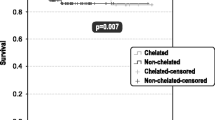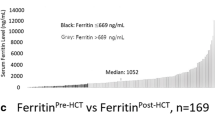Abstract
Myelodysplastic syndrome (MDS) is characterized by peripheral blood cytopenias and risk of progression to acute myeloid leukemia. Elevated serum ferritin (SF), due to ineffective erythropoiesis and increased iron absorption from the gut, is often observed in non-transfused MDS patients, suggesting involvement of iron overload in its pathogenesis. However, the prognostic value of the baseline SF is unclear. We evaluated baseline SF levels in non-transfused MDS patients. The SF level was significantly higher in the 47 MDS patients in this study than in the healthy controls (P < 0.001). The SF level of higher-risk MDS patients (int-2/high) was significantly higher than that of the lower-risk MDS patients (low/int-1) (467 ± 354 vs. 277 ± 372 ng/ml, P < 0.001). The SF level in MDS patients with chromosomal abnormality was significantly higher than that in patients with normal karyotype. When patients were divided into the low SF group (<500 ng/ml) and high SF group (≥500 ng/mL), the survival time was significantly longer in the former group than the latter group (118.8 vs. 10.2 M, P = 0.002). Further, leukemia-free survival (LFS) was significantly longer in the low SF group than the high SF group (P = 0.010). Baseline SF level may, therefore, be a prognostic factor for overall survival and LFS in MDS patients.



Similar content being viewed by others
References
Greenberg P, Cox C, LeBeau MM, Fenaux P, Morel P, Sanz G, Sanz M, et al. International scoring system for evaluating prognosis in myelodysplastic syndromes. Blood. 1997;89:2079–88.
Malcovati L, Porta MG, Pascutto C, Invernizzi R, Boni M, Travaglino E, Passamonti F, et al. Prognostic factors and life expectancy in myelodysplastic syndromes classified according to WHO criteria: a basis for clinical decision making. J Clin Oncol. 2005;23:7594–603.
Takatoku M, Uchiyama T, Okamoto S, Kanakura Y, Sawada K, Tomonaga M, Nakao S, et al. Retrospective nationwide survey of Japanese patients with transfusion-dependent MDS and aplastic anemia highlights the negative impact of iron overload on morbidity/mortality. Eur J Haematol. 2007;78:487–94.
Miyazawa K, Ohyashiki K, Urabe A, Hata T, Nakao S, Ozawa K, Ishikawa T, et al. A safety, pharmacokinetic and pharmacodynamic investigation of deferasirox (Exjade, ICL670) in patients with transfusion-dependent anemias and iron-overload: a Phase I study in Japan. Int J Hematol. 2008;88:73–81.
Mahesh S, Ginzburg Y, Verma A. Iron overload in myelodysplastic syndromes. Leuk Lymphoma. 2008;49:427–38.
Gattermann N, Finelli C, Porta MD, Fenaux P, Ganser A, Guerci-Bresler A, Schmid M, et al. Deferasirox in iron-overloaded patients with transfusion-dependent myelodysplastic syndromes: Results from the large 1-year EPIC study. Leuk Res. 2010;34:1143–50.
Remacha AF, Arrizabalaga B, Del Canizo C, Sanz G, Villegas A. Iron overload and chelation therapy in patients with low-risk myelodysplastic syndromes with transfusion requirements. Ann Hematol. 2010;89:147–54.
Wimazal F, Nosslinger T, Baumgartner C, Sperr WR, Pfeilstocker M, Valent P. Deferasirox induces regression of iron overload in patients with myelodysplastic syndromes. Eur J Clin Invest. 2009;39:406–11.
Metzgeroth G, Dinter D, Schultheis B, Dorn-Beineke A, Lutz K, Leismann O, Hehlmann R, et al. Deferasirox in MDS patients with transfusion-caused iron overload—a phase-II study. Ann Hematol. 2009;88:301–10.
Porter J, Galanello R, Saglio G, Neufeld EJ, Vichinsky E, Cappellini MD, Olivieri N, et al. Relative response of patients with myelodysplastic syndromes and other transfusion-dependent anaemias to deferasirox (ICL670): a 1-yr prospective study. Eur J Haematol. 2008;80:168–76.
Cappellini MD, Porter J, El-Beshlawy A, Li CK, Seymour JF, Elalfy M, Gattermann N, et al. Tailoring iron chelation by iron intake and serum ferritin: the prospective EPIC study of deferasirox in 1744 patients with transfusion-dependent anemias. Haematologica. 2010;95:557–66.
Rose C, Brechignac S, Vassilief D, Pascal L, Stamatoullas A, Guerci A, Larbaa D, et al. Does iron chelation therapy improve survival in regularly transfused lower risk MDS patients? A multicenter study by the GFM (Groupe Francophone des Myelodysplasies). Leuk Res. 2010;34:864–70.
Thol F, Friesen I, Damm F, Yun H, Weissinger EM, Krauter J, Wagner K, et al. Prognostic significance of ASXL1 mutations in patients with myelodysplastic syndromes. J Clin Oncol. 2011;29:2499–506.
Nikoloski G, Langemeijer SM, Kuiper RP, Knops R, Massop M, Tonnissen ER, van der Heijden A, et al. Somatic mutations of the histone methyltransferase gene EZH2 in myelodysplastic syndromes. Nat Genet. 2010;42:665–7.
Davids MS, Steensma DP. The molecular pathogenesis of myelodysplastic syndromes. Cancer Biol Ther. 2010;10:309–19.
Imai Y, Kurokawa M, Izutsu K, Hangaishi A, Takeuchi K, Maki K, Ogawa S, et al. Mutations of the AML1 gene in myelodysplastic syndrome and their functional implications in leukemogenesis. Blood. 2000;96:3154–60.
Walter MJ, Ding L, Shen D, Shao J, Grillot M, McLellan M, Fulton R, et al. Recurrent DNMT3A mutations in patients with myelodysplastic syndromes. Leukemia. 2011;25:1153–8.
Sallmyr A, Fan J, Rassool FV. Genomic instability in myeloid malignancies: increased reactive oxygen species (ROS), DNA double strand breaks (DSBs) and error-prone repair. Cancer Lett. 2008;270:1–9.
Diehn M, Cho RW, Lobo NA, Kalisky T, Dorie MJ, Kulp AN, Qian D, et al. Association of reactive oxygen species levels and radioresistance in cancer stem cells. Nature. 2009;458:780–3.
Ito K, Hirao A, Arai F, Takubo K, Matsuoka S, Miyamoto K, Ohmura M, et al. Reactive oxygen species act through p38 MAPK to limit the lifespan of hematopoietic stem cells. Nat Med. 2006;12:446–51.
Nitta E, Yamashita M, Hosokawa K, Xian M, Takubo K, Arai F, Nakada S, et al. Telomerase reverse transcriptase protects ATM-deficient hematopoietic stem cells from ROS-induced apoptosis through a telomere-independent mechanism. Blood. 2011;117:4169–80.
Sridhar K, Ross DT, Tibshirani R, Butte AJ, Greenberg PL. Relationship of differential gene expression profiles in CD34+ myelodysplastic syndrome marrow cells to disease subtype and progression. Blood. 2009;114:4847–58.
Mohamedali A, Gaken J, Twine NA, Ingram W, Westwood N, Lea NC, Hayden J, et al. Prevalence and prognostic significance of allelic imbalance by single-nucleotide polymorphism analysis in low-risk myelodysplastic syndromes. Blood. 2007;110:3365–73.
Chen G, Zeng W, Miyazato A, Billings E, Maciejewski JP, Kajigaya S, Sloand EM, et al. Distinctive gene expression profiles of CD34 cells from patients with myelodysplastic syndrome characterized by specific chromosomal abnormalities. Blood. 2004;104:4210–8.
Miyazato A, Ueno S, Ohmine K, Ueda M, Yoshida K, Yamashita Y, Kaneko T, et al. Identification of myelodysplastic syndrome-specific genes by DNA microarray analysis with purified hematopoietic stem cell fraction. Blood. 2001;98:422–7.
Rocquain J, Carbuccia N, Trouplin V, Raynaud S, Murati A, Nezri M, Tadrist Z, et al. Combined mutations of ASXL1, CBL, FLT3, IDH1, IDH2, JAK2, KRAS, NPM1, NRAS, RUNX1, TET2 and WT1 genes in myelodysplastic syndromes and acute myeloid leukemias. BMC Cancer. 2010;10:401.
Sato T, Kobune M, Murase K, Kado Y, Okamoto T, Tanaka S, Kikuchi S, et al. Iron chelator deferasirox rescued mice from Fas-induced fulminant hepatitis. Hepatol Res. 2011;41:660–7.
Tanno T, Miller JL. Iron Loading and Overloading due to Ineffective Erythropoiesis. Adv Hematol. 2010;2010:358283.
Park S, Sapena R, Kelaidi C, Vassilieff D, Bordessoule D, Stamatoullas A, Cheze S, et al. Ferritin level at diagnosis is not correlated with poorer survival in non RBC transfusion dependent lower risk de novo MDS. Leuk Res. 2011;35:1530–3.
Niitsu Y, Kohgo Y, Yokota M, Urushizaki I. Radioimmunoassay of serum ferritin in patients with malignancy. Ann N Y Acad Sci. 1975;259:450–2.
Leitch HA Vickars LM. Supportive care and chelation therapy in MDS: are we saving lives or just lowering iron? Hematology Am Soc Hematol Educ Program. 2009:664–72.
Suzuki T, Tomonaga M, Miyazaki Y, Nakao S, Ohyashiki K, Matsumura I, Kohgo Y, et al. Japanese epidemiological survey with consensus statement on Japanese guidelines for treatment of iron overload in bone marrow failure syndromes. Int J Hematol. 2008;88:30–5.
Wells RA, Leber B, Buckstein R, Lipton JH, Hasegawa W, Grewal K, Yee K, et al. Iron overload in myelodysplastic syndromes: a Canadian consensus guideline. Leuk Res. 2008;32:1338–53.
Kato J, Kobune M, Nakamura T, Kuroiwa G, Takada K, Takimoto R, Sato Y, et al. Normalization of elevated hepatic 8-hydroxy-2′-deoxyguanosine levels in chronic hepatitis C patients by phlebotomy and low iron diet. Cancer Res. 2001;61:8697–702.
Sato T, Machida T, Takahashi S, Murase K, Kawano Y, Hayashi T, Iyama S, et al. Apoptosis supercedes necrosis in mitochondrial DNA-depleted Jurkat cells by cleavage of receptor-interacting protein and inhibition of lysosomal cathepsin. J Immunol. 2008;181:197–207.
Watson AS, Mortensen M, Simon AK. Autophagy in the pathogenesis of myelodysplastic syndrome and acute myeloid leukemia. Cell Cycle. 2011;10:1719–25.
Rassool FV, Gaymes TJ, Omidvar N, Brady N, Beurlet S, Pla M, Reboul M, et al. Reactive oxygen species, DNA damage, and error-prone repair: a model for genomic instability with progression in myeloid leukemia? Cancer Res. 2007;67:8762–71.
Komrokji RS, Al Ali NH, Padron E, Lancet JF, List AF. Impact of iron chelation therapy on overall survival and AML transformation in lower risk MDS Patients treated at the Moffitt Cancer Center. Blood. 2011;118:2776a.
Mittelman M, Oster HS, Hoffman M, Neumann D. The lower risk MDS patient at risk of rapid progression. Leuk Res. 2010;34:1551–5.
Acknowledgments
All authors critically revised the manuscript for important intellectual content and approved its final version.
Conflict of interest
The authors declare no competing financial interests.
Author information
Authors and Affiliations
Corresponding author
Electronic supplementary material
Below is the link to the electronic supplementary material.
About this article
Cite this article
Kikuchi, S., Kobune, M., Iyama, S. et al. Prognostic significance of serum ferritin level at diagnosis in myelodysplastic syndrome. Int J Hematol 95, 527–534 (2012). https://doi.org/10.1007/s12185-012-1048-3
Received:
Revised:
Accepted:
Published:
Issue Date:
DOI: https://doi.org/10.1007/s12185-012-1048-3




